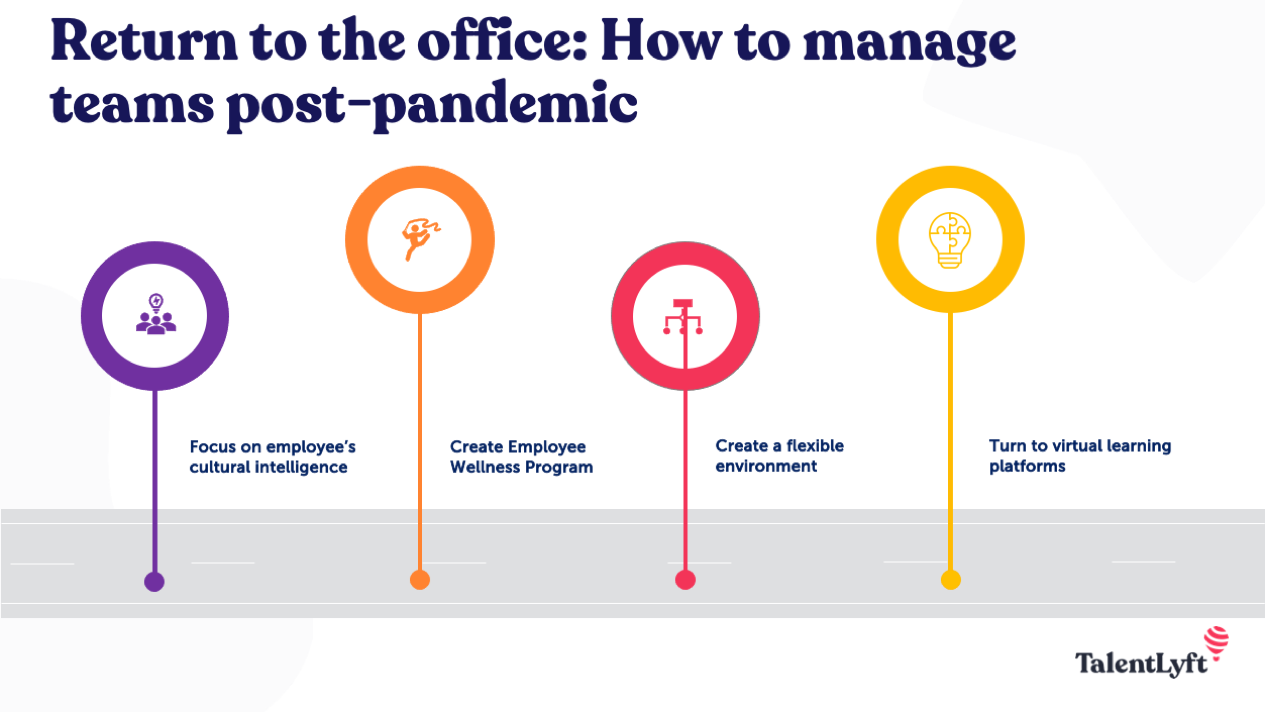![https://adoptostaging.blob.core.windows.net/article/TgJznrYC40CVFtXEI9KatQ.png]()
While the data shows that productivity remained almost the same in the past two years since the pandemic, regardless of the type of working, managers are announcing more and more measures to almost force employees to return to the office; including pay cuts, lower chances for promotion, and so on. (source: cnbc.com)
Such data indicates the increasing number of managers hardly coping with the stress of remote management and being the ones who carry on most of its weight. Therefore, we asked ourselves - what is the right approach to team management in these dynamic times post pandemic for the wellbeing of employees and managers and the benefit of productivity?
Select top talent to join your company post-pandemic with the help of TalentLyft
Schedule a quick call with one of our product specialists and learn more about accelerating your hiring with TalentLyft.
Book a quick call Return to the office: Adapting team management
Managing teams has always been a challenging task, but during Covid-19 pandemic this challenge became even more prominent.
The research suggests that the future of work is going to be more dynamic and virtual and that the normal physical work arrangements that were in place before the pandemic will evolve to include multiple models. Many companies have already implemented such a change and we are seeing workplaces where some employees choose to work on-site, some adopt hybrid models and others decide to work completely remote.
Such working arrangements bring several challenges like reduced trust, disrupted communication, limited collaboration, lack of role clarity, lowered team performance and a negative impact on employee wellbeing. However, finding the right strategy to handle these challenges will make the company stand out among others and gain competitive advantage in this inevitably changing environment.
Therefore, here are things to consider when adapting your team management strategy for post pandemic:
Focus on employee’s cultural intelligence
Create employee wellbeing programs
Incorporate flexibility in all pores of your organization
Turn to virtual learning platforms

Focus on employee’s cultural intelligence
Interesting research from Mangla (2021), published by Sage journal, identified a significant importance of Cultural Intelligence for managing successful teams post pandemic. The term is defined as “the skill that enables a person to become flexible for understanding other cultures, learning from ongoing interactions and gradually reshaping their thinking” (Thomas and Inkson, 2008).
In other words, the intercultural remote environment introduces the need for more interaction and virtual collaboration which without a proper understanding from everyone involved can be a stressful act, leading to more frustration and lower team productivity.
As the research found, cultural intelligence helps in creating a peaceful and positive environment in diverse teams which is proven to increase organizational commitment and job performance. Additionally, as other studies found, the importance of cultural intelligence also reflects on performance, cultural adaptation and collaboration which are necessary for a virtual team effectiveness as cross-cultural and team collaboration challenges.
Therefore, investing in educational programs for your recruitment and HR teams to be able to select the right talent for this new environment and then educating current employees on the importance of cultural intelligence is what managers have to consider when adapting to this new working environment.
Create employee wellbeing programs
Both managers and employees are experiencing extreme consequences of working in a remote environment. The consequences of increased stress are reflecting on the level of burnout among managers and employees. More specifically, employees and managers are coping with the challenges of:
Balancing the conflict between work and private life
Impacts of technology use on stress and work exhaustion
Coping with the COVID-19 crisis
Consequently, U.S. Census Bureau reports that 42% of people surveyed in 2020 reported symptoms of anxiety and depression, an 11% increase from the previous year (source: Harvard Business Review).
To overcome this stress, employers can turn to Employees wellness programs that have proven benefits, both for employers and employees. It leads to: reduced health costs, higher engagement, improved productivity, higher employee satisfaction, easier recruiting, improved employer branding and much more. If you want to learn more about the benefits of building an Employee Wellness Program, make sure to check out our article 8 Key Benefits of Employee Wellness Programs.
Flexibility as the dominant factor
Just like it is essential to create a flexible recruitment process, it is equally important to provide flexibility in team management in the period post pandemic. Flexibility is definitely something that marked us all during the past two years. From having to be flexible about Covid-19 restrictions and lack of long term perspective depending on the state of the pandemic to regularly adjusting how and where we do our job.
Therefore, being flexible about when and where your team members can do their job and focusing on the important aspect of their job by providing them assistance is what will maximize your team’s performance.
Assess the right skills by creating a structured interview process for your candidates
Implement TalentLyft and accelerate your hiring, today! Book a quick call with one of our product specialists to learn more.
Book a quick call Virtual learning platforms
“According to a Deloitte report on ‘learnings from the COVID-19 pandemic India perspective’, organizations are rethinking new employment models and suggest training employees to be future ready through virtual learning platforms.“(source: Deloitte)
Additionally, the focus is slowly moving from leadership training to organization-wide training. Managers learning how to manage their teams and employees learning how to be managed in this new environment, are two sides of the same coin. Besides managers having to adjust their team management for the post-pandemic environment, employees need some adjustment and learning as well.
Therefore, virtual learning platforms will encourage both managers and employees to take part in a range of courses. Not only to acquire new hard skills but also to adjust to the new working environment. Ultimately, with virtual learning platforms, you will improve performance, cultural adaptation and collaboration which are all necessary for a virtual team's effectiveness as cross-cultural and team collaboration challenges are highly reflected in the virtual teams’ literature.
Turn to technology for help
In the new flexible environment we are all working in at the moment when geographical differences are no longer an obstacle to a good performance, having the right technology becomes essential. With a good technological setup, you can hire the right team members for this new environment by assessing the right skills, seamlessly collaborating with your team and creating a more structured hiring process.
Ultimately, managing teams remotely becomes impossible if you are not working hand in hand with the right technology. Therefore, start by assessing your needs and identifying room for progress and make the right investment in technology to help you hire and manage teams for the flexible environment.













![8 Ways Corporate Merchandise Inspires Workers [INFOGRAPHIC INCLUDED]](https://adoptostaging.blob.core.windows.net/article/0plWRulhpE2dFBvZ3XIloQ.png)